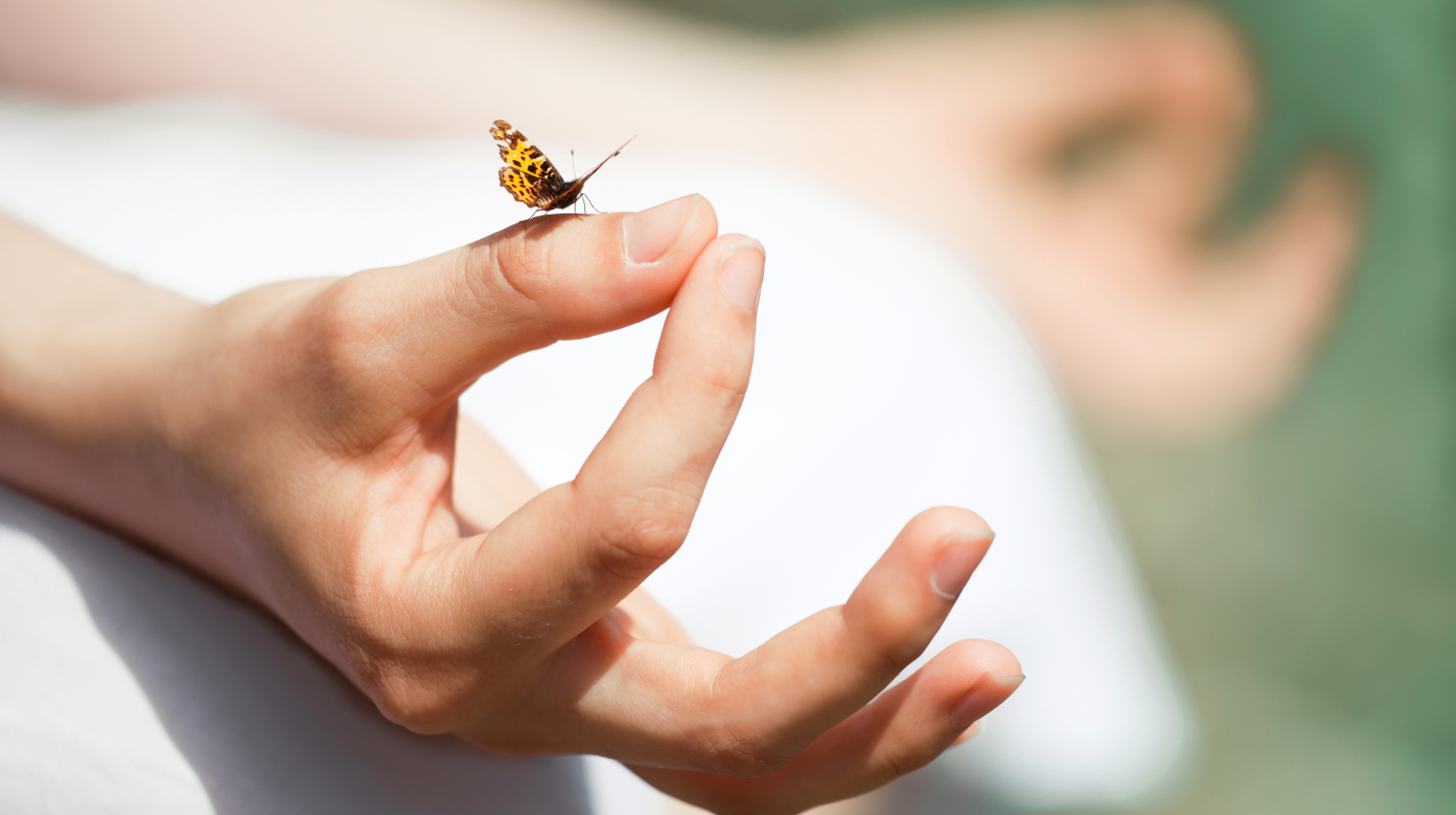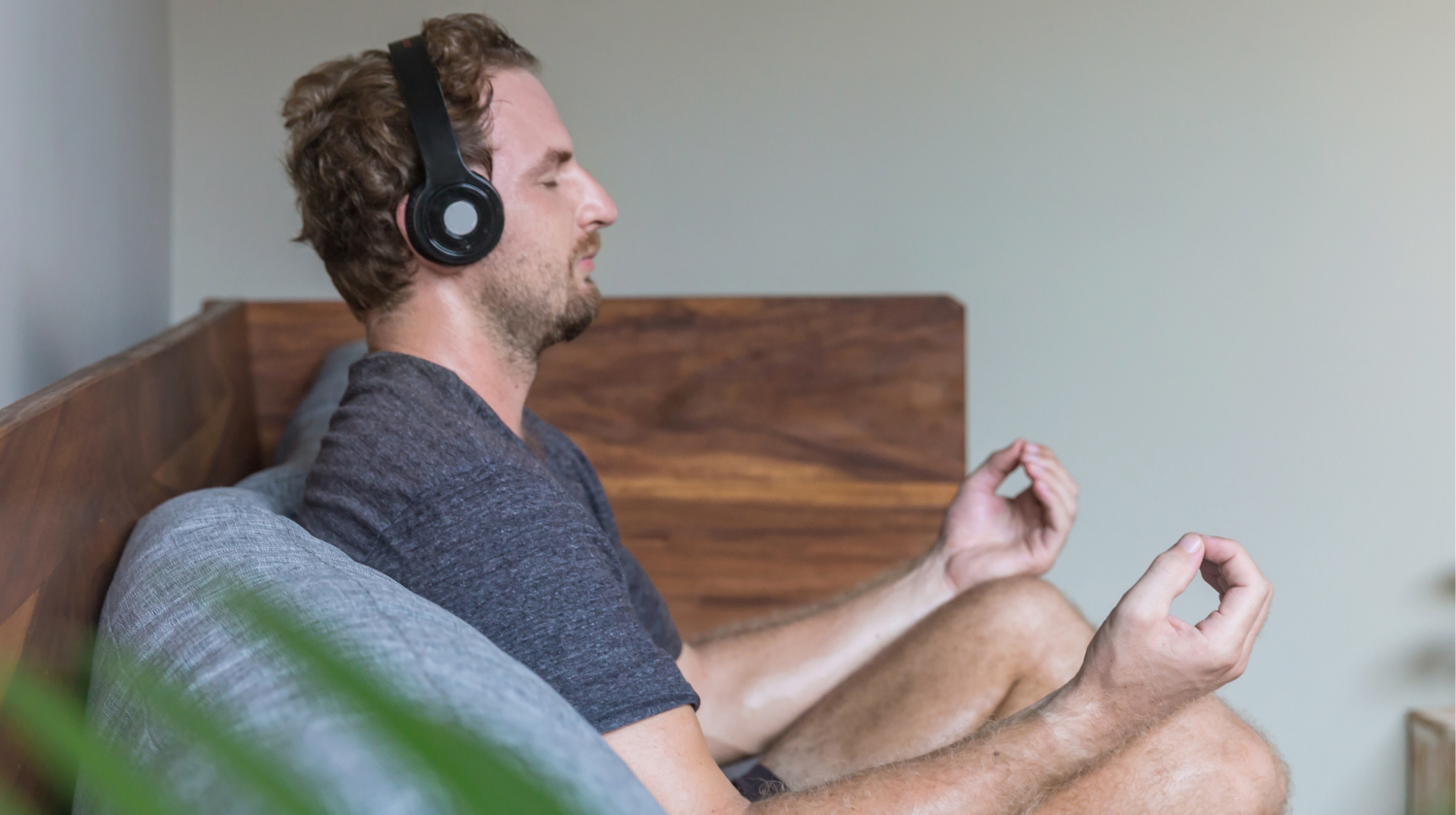Meditation For Depression: Does It Work & How To Begin 2024

Depression impacts millions of people. The World Health Organization states depression is the “single largest contributor to global disability,”[1] affecting approximately one in five[2] people in their lifetime.
But can meditation help with depression? In recent years, people have started seeking alternative methods to alleviate their depression symptoms and mental health difficulties. Meditation is one such method.
Today, meditation is a fast-growing trend in America when it comes to complementary healthcare. Of meditation users, 76.2% use it for general wellness, 29.2% for anxiety, and 17.8%[3] use meditation for depression, highlighting the growing importance of meditation complementing conventional medical care.
Read on to learn about the benefits of meditation for depression and other mental health difficulties and how to get started with practicing meditation.
Does Meditation Help With Depression?
Yes, meditation can help with depression.
- Approximately 17.8%[3] of meditation users utilize meditation for depression symptoms.
- Meditation can improve emotional regulation, cognitive flexibility, and resilience.
- Meditation can also help reduce overthinking, helping you get a better night’s sleep.
- Overall, meditation for depression is an invaluable tool with many positive outcomes.
Symptoms Of Depression
It’s common for people struggling with depression to feel generally unhappy without clearly understanding their feelings or why they feel the way they do. Depression can also feel different to different people, depending on its cause. Here are a few symptoms of depression[4] that can help identify such feelings:
- Sadness or hopelessness: Persistent feelings of sadness, emptiness, or hopelessness.
- Loss of interest: Reduced enjoyment in most normal and day-to-day activities like hobbies, sports, or spending time with friends and family.
- Sleep disturbances: Insomnia, oversleeping, and other sleep-related issues.
- Appetite changes: Abnormally reduced or increased appetite and weight loss or weight gain.
- Fatigue: Tiredness, lack of energy.
- Anxiety Symptoms: Feelings of anxiety, agitation, constant worrying, and ruminating.
- Worthlessness: Persistent feelings of guilt, self-blame, or fixation on past failures or problems.
- Difficulty concentrating: Slowed cognition, impaired decision-making, and poor memory.
- Suicidal thoughts: Frequent thoughts of death, suicide attempts, or suicide.
- Unexplained physical issues: Physical problems without clear causes, such as back pain or headaches.
- Irritability: Angry outbursts, frustration over trivial matters, and inability to regulate emotions.
Benefits Of Meditation For Depression
Depression has traditionally been treated through conventional medical care, often involving a combination of pharmacological interventions, therapy, and lifestyle changes.
However, in recent years, there has been growing interest in alternative approaches, such as mindfulness-based cognitive therapy, to combat depression.
At this point, you may still wonder, does meditation help with depression? Meditation,[5] in specific, has become a rapidly growing area of research and is being increasingly recognized in the scientific community for its potential to address depression, generalized anxiety disorder,[6] and post-traumatic stress disorder.[7]
Here are some of the benefits of meditation for mental health difficulties like anxiety and depression:
- Better emotion control: Meditation can improve our ability to control our emotions.[8] Through regular practice, meditation trains us to notice our thoughts the moment they arise to decide how we should react or feel about something. This can be crucial in coming out of negative feelings, thought spirals, and major depressive episodes.
- Increased resilience:[9] We learn to observe our thoughts and emotions without judgment through meditation, helping us develop a more objective worldview. This creates a healthy distance between us and our thoughts and feelings, helping us take things less personally and respond to stressful situations more resiliently.
- Increased neuroplasticity: Meditation may increase neuroplasticity[10] in various brain regions, such as the prefrontal cortex — responsible for cognitive processes like problem-solving and decision-making — and the amygdala, — responsible for processing emotions like fear and anxiety and triggering the stress response.
- Better sleep quality:[11] Major depression often causes sleep disturbances. Meditation practices like a body scan or mindful breathing can reduce stress levels and help the body get more restful sleep.
- Increased self-esteem: Low self-esteem is a common symptom of major depression. Meditation practices such as loving-kindness meditation[12] can help us develop a more compassionate worldview and a positive self-image, leading to a healthier sense of self-worth. However, persons beginning to use this method must be aware of negative feelings that can result, such as guilt.
- Reduced rumination: Meditation reduces rumination,[13] the tendency to dwell on negative thoughts and difficult emotions, a common symptom of depression.
Types Of Meditation That Can Help Treat Depression
While the basic principles of meditation are the same, they can be practiced through different methods and techniques. Here are a few types of meditation that can help treat depression:
Vipassana Or Mindfulness Meditation

Also known as insight meditation or mindfulness-based stress reduction, mindfulness meditation involves training the mind to be aware of the present moment without judgment. Mindfulness meditation[14] can help us be less reactive and maintain neutrality in the face of negative thoughts and difficult emotions.
Metta

The word, Metta, comes from Pali, an ancient Indian language, and translates to positive energy and kindness towards others. Also popular as loving-kindness meditation, a Metta practice involves cultivating unconditional love and compassion towards oneself and others. Regular practice of loving-kindness meditation[15] can increase positive emotions and alleviate depressive symptoms.
Body Scan Meditation

Body scan[16] meditation has mixed reviews in the medical literature, but it is only beginning to be studied. This technique has you focus on the physical sensations in your body, slowly noticing the sensations in different parts of your body as they arise. The sensations can be different, such as pressure, tension, movement, texture, and dryness, which you patiently observe them without reacting. By deepening your awareness of your body, you learn how it reacts to different stimuli and better identify external events that trigger stress. However, current research indicates body scan meditation is inferior[17] to other methods for addressing depression.
Walking Meditation

This type of meditation involves walking slowly and mindfully, paying attention to the sensations in your body, such as the rhythm of your breath, the contraction of your muscles, or any tension or tightness in your body. Walking meditation can be a great way to calm the mind and reduce stress levels.[18]
Breathing Techniques

Focusing on the breath can help you become more aware of your thoughts and emotions and can help reduce stress levels. Techniques such as deep breathing and diaphragmatic breathing can be effective in reducing symptoms of depression.[19]
Guided Meditation

For people new to meditation practice, guided sessions can be an effective way to meditate. In a guided meditation for depression symptoms, you follow along with the voice of an instructor who guides your attention in a structured way. This could include visualizations, affirmations, breathing instructions, or body scan meditation. Guided meditation has been shown to significantly reduce depression symptoms.[20]
How To Begin A Meditation Practice
Meditation is simple, with no external tools or equipment required. All that’s needed is your breath and your attention, which are always there. To begin your meditation practice, consider the following steps:
- Decide a method: Go through the above list and choose a meditation method that resonates the most with you.
- Decide a time of day: Dedicate a time of day for your meditation, even if it’s just for a few minutes. What’s important is not the quantity of the practice but its continuity.
- Decide on a quiet space: Look around your surroundings, and pick a quiet, comfortable area where you can sit without any interruptions or distractions.
- Keep a timer: Before you begin your meditation practice, remember to set a timer so you don’t have to worry about checking the time during the sit.
- Start meditating for a few minutes each day: Begin your meditation practice with short sessions. You can start with 5-10 minutes, gradually increasing the duration as you get more comfortable.
- Maintain good posture: Sit comfortably on a chair or cross-legged on a cushion. Keep a straight back to avoid drowsiness, and relax your shoulders to avoid tension.
Other Natural Remedies For Depression
Meditation can be a life-changing habit that can help treat major depressive disorder and improve mental well-being. But it works even better when combined with other natural remedies, such as:
- Physical Exercise: Regular exercise[21] has been proven to release endorphins, reduce stress, and improve mood.
- Yoga: Practising yoga for depression combines physical movement, breath control, and meditation, which can help enhance relaxation, reduce stress, and improve mood.
- Sleep: Establish good sleep habits,[22] such as having a consistent sleep schedule, avoiding heavy meals or screen time right before bed, regulating caffeine intake, and having a bedtime routine.
- Sunlight: Get sufficient exposure to sunlight[23] — ideally, early in the day — to boost your mood and alleviate depression symptoms.
- Therapy: Seeking professional help from a therapist or counselor can help alleviate depression symptoms.
The Takeaway
Meditation can be invaluable in managing depression, bringing lasting emotional benefits. Cultivating a meditation practice can be a rewarding choice for your mental health. As you continue on this journey, be patient with yourself and take it one day at a time.
+ 23 sources
Health Canal avoids using tertiary references. We have strict sourcing guidelines and rely on peer-reviewed studies, academic researches from medical associations and institutions. To ensure the accuracy of articles in Health Canal, you can read more about the editorial process here
- Depression and Other Common Mental Disorders Global Health Estimates 3 DEPRESSION AND OTHER COMMON MENTAL DISORDERS: GLOBAL HE ALTH ESTIMATES. (n.d.). Available at: https://apps.who.int/iris/bitstream/handle/10665/254610/WHO-MSD-MER-2017.2-eng.pdf?sequence=1.
- Ménard, C., Hodes, G.E. and Russo, S.J. (2016). Pathogenesis of depression: Insights from human and rodent studies. Neuroscience, [online] 321, pp.138–162. doi:https://doi.org/10.1016/j.neuroscience.2015.05.053.
- Cramer, H., Hall, H., Leach, M., Frawley, J., Zhang, Y., Leung, B., Adams, J. and Lauche, R. (2016). Prevalence, patterns, and predictors of meditation use among US adults: A nationally representative survey. Scientific Reports, [online] 6(1). doi:https://doi.org/10.1038/srep36760.
- National Institute of Mental Health (NIMH). (2023). Depression. [online] Available at: https://www.nimh.nih.gov/health/topics/depression
- Baminiwatta, A. and Solangaarachchi, I. (2021). Trends and Developments in Mindfulness Research over 55 Years: A Bibliometric Analysis of Publications Indexed in Web of Science. Mindfulness, [online] 12(9), pp.2099–2116. doi:https://doi.org/10.1007/s12671-021-01681-x.
- Hoge, E.A., Bui, E., Palitz, S.A., Schwarz, N.R., Owens, M.E., Johnston, J.M., Pollack, M.H. and Simon, N.M. (2018). The effect of mindfulness meditation training on biological acute stress responses in generalized anxiety disorder. Psychiatry Research, [online] 262, pp.328–332. doi:https://doi.org/10.1016/j.psychres.2017.01.006.
- Jayatunge, R.M. and Pokorski, M. (2018). Post-traumatic Stress Disorder: A Review of Therapeutic Role of Meditation Interventions. Advances in Experimental Medicine and Biology, [online] pp.53–59. doi:https://doi.org/10.1007/5584_2018_167.
- Basso, J.C., McHale, A., Ende, V., Oberlin, D.J. and Suzuki, W.A. (2019). Brief, daily meditation enhances attention, memory, mood, and emotional regulation in non-experienced meditators. Behavioural Brain Research, [online] 356, pp.208–220. doi:https://doi.org/10.1016/j.bbr.2018.08.023.
- Modi, R. and Singh, A. (2022). Role of meditation in resilience and hope among students. Industrial Psychiatry Journal, [online] 31(2), p.364. doi:https://doi.org/10.4103/ipj.ipj_183_21.
- Tolahunase, M.R., Sagar, R., Faiq, M. and Dada, R. (2018). Yoga- and meditation-based lifestyle intervention increases neuroplasticity and reduces severity of major depressive disorder: A randomized controlled trial. Restorative Neurology and Neuroscience, [online] 36(3), pp.423–442. doi:https://doi.org/10.3233/rnn-170810.
- Rusch, H.L., Rosario, M., Levison, L.M., Olivera, A., Livingston, W.S., Wu, T. and Gill, J.M. (2018). The effect of mindfulness meditation on sleep quality: a systematic review and meta‐analysis of randomized controlled trials. Annals of the New York Academy of Sciences, [online] 1445(1), pp.5–16. doi:https://doi.org/10.1111/nyas.13996.
- Carrero, I., Martínez de Ibarreta, C., Valor, C. and Merino, A. (2022). Does loving‐kindness meditation elicit empathic emotions? The moderating role of self‐discrepancy and self‐esteem on guilt. Applied Psychology: Health and Well-Being. [online] doi:https://doi.org/10.1111/aphw.12416.
- Owens, M. and Bunce, H.L.I. (2022). Nature-Based Meditation, Rumination and Mental Wellbeing. International Journal of Environmental Research and Public Health, [online] 19(15), p.9118. doi:https://doi.org/10.3390/ijerph19159118.
- van der Riet, P., Levett-Jones, T. and Aquino-Russell, C. (2018). The effectiveness of mindfulness meditation for nurses and nursing students: An integrated literature review. Nurse Education Today, [online] 65, pp.201–211. doi:https://doi.org/10.1016/j.nedt.2018.03.018.
- Stefan, S. and Hofmann, S.G. (2019). Integrating Metta Into CBT: How Loving Kindness and Compassion Meditation Can Enhance CBT for Treating Anxiety and Depression. Clinical Psychology in Europe, [online] 1(3). doi:https://doi.org/10.32872/cpe.v1i3.32941.
- Guthrie, T., Matthews, J.R., Chambers, R., Windt, J. and Hohwy, J. (2022). Changes in Multisensory Integration Following Brief State Induction and Longer-Term Training with Body Scan Meditation. Mindfulness, [online] 13(5), pp.1214–1231. doi:https://doi.org/10.1007/s12671-022-01869-9.
- Gan, R., Zhang, L. and Chen, S. (2022). The effects of body scan meditation: A systematic review and meta‐analysis. Applied Psychology: Health and Well-Being, [online] 14(3), pp.1062–1080. doi:https://doi.org/10.1111/aphw.12366.
- Edwards, M.K., Rosenbaum, S. and Loprinzi, P.D. (2017). Differential Experimental Effects of a Short Bout of Walking, Meditation, or Combination of Walking and Meditation on State Anxiety Among Young Adults. American Journal of Health Promotion, [online] 32(4), pp.949–958. doi:https://doi.org/10.1177/0890117117744913.
- Jerath, R., Crawford, M.W., Barnes, V.A. and Harden, K. (2015). Self-Regulation of Breathing as a Primary Treatment for Anxiety. Applied Psychophysiology and Biofeedback, [online] 40(2), pp.107–115. doi:https://doi.org/10.1007/s10484-015-9279-8.
- Hariri, S., Vishnubhotla, R.V., Reed, P.U., Rayapuraju, A., Orui, H., Balachundhar, P., Sadhasivam, S. and Subramaniam, B. (2022). Online guided meditation training (Isha Kriya) improves self-reported symptoms of anxiety and depression within 2 weeks of practice—An observational study. Frontiers in Psychiatry, [online] 13. doi:https://doi.org/10.3389/fpsyt.2022.944973.
- Gultyaeva, V.V., Zinchenko, M.I., Uryumtsev, D.Y., Krivoschekov, S.G. and Aftanas, L.I. (2019). Exercise for depression treatment. Physiological mechanisms. Zhurnal nevrologii i psikhiatrii im. S.S. Korsakova, [online] 119(7), p.112. doi:https://doi.org/10.17116/jnevro2019119071112.
- Irish, L.A., Kline, C.E., Gunn, H.E., Buysse, D.J. and Hall, M.H. (2015). The role of sleep hygiene in promoting public health: A review of empirical evidence. Sleep Medicine Reviews, [online] 22, pp.23–36. doi:https://doi.org/10.1016/j.smrv.2014.10.001.
- Wang, S.-J. and Chen, M.-Y. (2020). The effects of sunlight exposure therapy on the improvement of depression and quality of life in post-stroke patients: A RCT study. Heliyon, [online] 6(7), p.e04379. doi:https://doi.org/10.1016/j.heliyon.2020.e04379.



